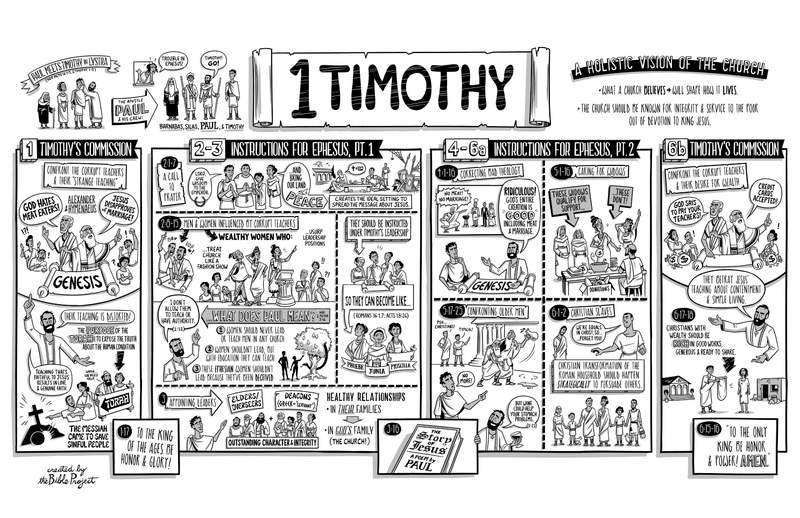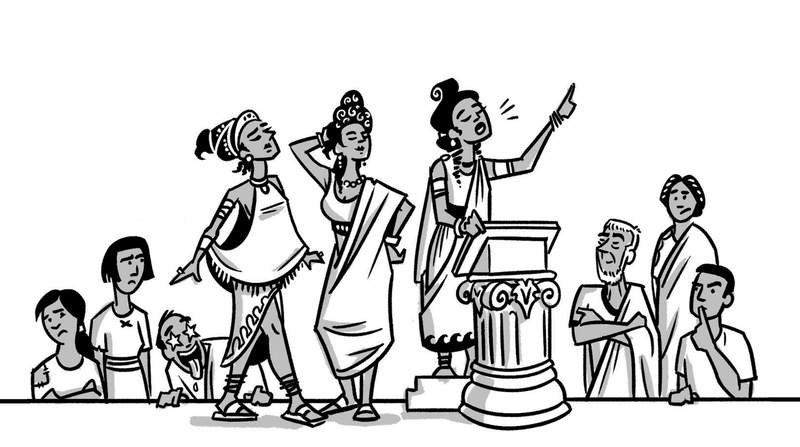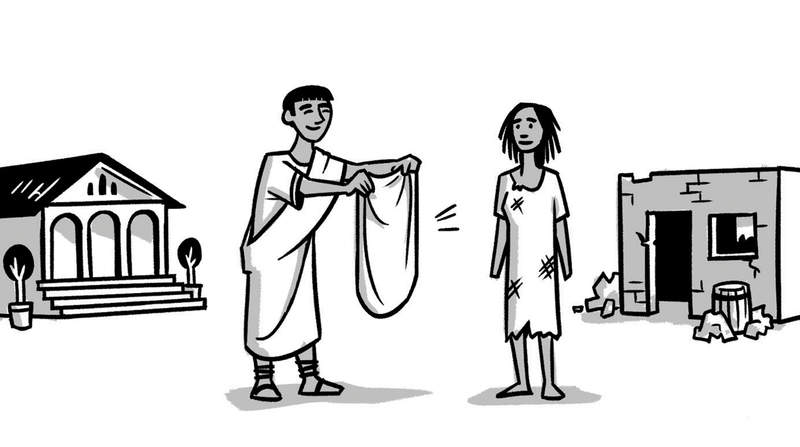The Book of 1 Timothy
About

Paul spent many years traveling to start new Jesus communities, and he developed a large team of coworkers in the process. Timothy was one such coworker. Once, when Paul visited Lystra, he met Timothy’s faithful mother and grandmother (2 Tim. 1:5; Acts 16:1-3). He was impressed by the young Timothy’s passion and devotion to Jesus. Paul mentored him for many years, often sending him on missions to some of the churches he had started. When Paul heard about a group of leaders that had infiltrated the church in Ephesus, spreading incorrect views about Jesus, he sent Timothy to confront them and restore order to the community. After Timothy’s arrival, Paul sent this letter to instruct him on how to fulfill his mission.
The letter is brilliantly designed. There is both an opening and a closing address (1 Tim. 1; 6b), in which Timothy is commissioned to confront these corrupt leaders and their bad theology. These sections bookend two large central sections (1 Tim. 2-3; 4-6a), which are full of practical instructions about the specific problems Timothy faced in the Ephesian church. Finally, all of these sections are linked together by a series of three poems (1 Tim. 1:17; 3:16; 6:15-16) that exalt the risen Jesus as the King of the world.
Who Wrote the Book of 1 Timothy?
Context
Key Themes
- Love and genuine faith in the Church
- Equality and responsibility for the marginalized in the community
- Hope in Jesus as King of the world in spite of suffering
Structure
1 Timothy 1: The True Purpose of the Torah
Paul opens by recalling his sending of Timothy to Ephesus to confront the leaders spreading false or “strange teaching” (1 Tim. 1:3). He describes them as being obsessed with speculation about the Torah, specifically with the early stories and genealogies from the book of Genesis. As we’ll soon find out, they had developed all kinds of strange ideas about food, marriage, and sexuality, none of which were consistent with the teachings of Jesus or the apostles. Paul even names some of them, Alexander and Hymenaeus (1 Tim. 1:20), describing how their teaching has divided the church and generated controversy. Paul says that this is a clear sign that their message is distorted because true Christian teaching that’s faithful to the way of Jesus results in love and genuine faith.
Paul also says that the purpose of the Torah is not to fuel speculation but to expose the truth of the sinful human condition, as it did for Paul himself. Correct teaching about the Torah will lead people to see the grace of God revealed in the Messiah, who came into the world to save sinful, broken people (1 Tim. 1:16). Paul closes with a poem that honors Jesus as King. He then calls Timothy to confront these men and shut down their false teaching.
1 Timothy 2-3: Problems Caused by Corrupt Teachers
In chapters 2-3, Paul addresses the specific problems caused by the corrupt teachers. He calls on Timothy to hold regular church gatherings and pray for the governing leaders of Rome and for peace (1 Tim. 2:1-7). Peace in the land creates the ideal setting for Jesus’ followers to spread their message about the God of peace, who wants all people to be saved. This is why Jesus came as the one and only mediator to give his life as ransom for all people. In contrast to the corrupt teachers, Paul reminds Timothy that God’s desire is to rescue the whole world.
Paul then addresses problems related to men and women who have been influenced by the corrupt leaders in Ephesus (1 Tim. 2:8-15). Paul calls out the men who were getting drawn into angry theological disputes started by the teachers (1 Tim. 2:8). Next, he confronts a group of wealthy women in the church who were treating the Sunday gathering as a fashion show, dressing upscale and shaming those who couldn’t afford expensive wardrobes. Not only that, but some of these women were usurping leadership positions in the church and teaching others the same bad theology as the corrupt teachers (1 Tim. 2:9-15).

Paul addresses this issue by saying that the women should not teach or lead in the church, making a reference back to the story from Genesis 3. This is one of those sections in Paul’s letters that Peter referred to when he said Paul is hard to understand (2 Pet. 3:16). There are lots of different views on what Paul actually means here. There are some who think that Paul is prohibiting women from ever leading or teaching men in any church and that his comments about Adam and Eve mean God has ordered that only men should be leaders in the Church. There are others who think that Paul is prohibiting women from having leadership authority over men, but that they can serve as teachers under male leadership once educated. There are still others who think that Paul is only prohibiting these specific women in Ephesus and that his comments about Adam and Eve are a comparison of how these women have been deceived by the false teachers. Whichever view you take, Paul is clear that these Ephesian women need leadership and a proper theological education. Ultimately, the goal is to help them mature so that they can become like the outstanding female ministers mentioned in Paul’s other letters, like Phoebe (Rom. 16:1), Junia (Rom. 16:7), or Priscilla (Acts 18:26).
In chapter 3, Paul continues to address this leadership crisis, calling Timothy to appoint a small, healthy team of husbands and fathers who will act as elders or overseers to the church. These should be men of outstanding character and integrity who will work alongside a team of deacons, a Greek word meaning “servant.” The deacons are a group of men and women who possess the same upstanding character as the elders and will lead the ministries of the church. All of these people should be known for healthy relationships within their families, demonstrating their ability to lead in their church, which is God’s family, and they should live alongside each other in the new family created by King Jesus. Jesus’ story is explored in the closing poem. 1 Timothy 3:16 is all about his incarnation, death, and resurrection that led to his exaltation as King and the spread of his family through the world.
1 Timothy 4-6a: More Problems Related to False Teaching
Paul’s second section of instructions in chapters 4-6a are also centered around specific problems caused by the false teachers. Paul once again corrects their bad theology. They’re telling people to stop eating certain foods and getting married, which Paul thinks is ridiculous. Paul appeals to Genesis 1 and reminds Timothy that God’s entire creation is good, including all foods and marriage. All of it is to be received with gratefulness by those who know the Creator.
Paul moves on to address problems with the church’s care of widows (1 Timothy 5:1-16). This important ministry was being abused by younger, wealthy widows (likely the same troublemakers from chapter 2). They would sign up for the church’s support and then spend their days sleeping around, spreading gossip, and damaging the church’s reputation. Paul put his foot down. He made it clear to Timothy that only older widows with no other family support should qualify. For widows who really need it, the church should show the same love and generosity of Jesus.
Next, Paul writes about problems among the older men in the church. Timothy is to respect their age but not their misbehavior, which seems related to alcohol abuse. Whatever they’re doing, it’s damaging the church’s reputation in Ephesus. Timothy is to lovingly confront them and have them step down if they are in leadership positions. Paul also adds that this doesn’t mean Timothy himself should never drink. Given his stomach problems, he should have a glass of wine each night with dinner.
In chapter 6, Paul addresses a problem with some Christians in Ephesus who were enslaved and disrespecting their Christian masters. This was tricky for Paul. The Gospel creates equality among all of Jesus’ followers, but that equality must be implemented in a strategic way that doesn’t compromise the mission of the Church. If Christians become associated with slave rebellions, they will undermine the effectiveness of their message. The Christian transformation of the Roman household should be implemented strategically so that their neighbors can be persuaded and not repulsed by the radically different, new vision of God’s family.
1 Timothy 6b: Rich in Generosity
Paul closes the letter by once again calling Timothy to confront the corrupt teachers. Paul exposes their motive to make lots of money by accumulating followers and charging high rates. They betray Jesus’ message of contentment and simple living, so Paul instructs the wealthy Ephesian Christians to be rich in good works and act generously. He encourages them to submit all their resources to King Jesus, inspiring a final poem about how Jesus is the true King over all others.
1 Timothy is a crucially important letter, in which we can gain a holistic vision of the nature and mission of the Church. What a Jesus community believes will directly shape how that community lives and behaves, so its theology and beliefs must be constantly formed by the Scriptures and the good news about Jesus. At the same time, how the church is perceived is also important. Christians should be people that are full of integrity and known for good works, serving the poor and the most vulnerable out of their devotion to the risen King Jesus.
